Anthony Kennedy Drops A Big Hint About Potential Retirement in 2018
Justice Kennedy is telling prospective law clerks for the term that beings in October 2018 that he is considering retiring at the end of the term that begins this October.
In the months before the end of the last Supreme Court term, Washington and the media were rife with speculation that we might see a retirement on the Supreme Court that would lead to another round of confirmation hearings this year. In some sense, that speculation was natural given the fact that two of the Justices, Ginsburg and Kennedy, were over 80 years old and two others, Breyer and Thomas, are either in or nearing their 70s. That speculation was enhanced shortly after the confirmation process for Justice Neil Gorsuch ended when Senate Judiciary Committee Chairman Chuck Grassley made comments to local media in Iowa that made it sound like he had inside information about an impending retirement. Given the fact that it seemed unlikely that Justice Ginsburg would willingly step aside while a Republican, especially Donald Trump, was in the White House, that speculation quickly began to center around Justice Anthony Kennedy, who has been on the Court since 1989 and has been a sitting Federal Judge since being confirmed to sit on the Ninth Circuit Court of Appeals in 1975. In the weeks before the term ended last week, that speculation increased given the fact that Kennedy was hosting a reunion of all his former law clerks, which he had not done in several years, and many speculated that he would use that event to announce retirement plans. As it turned out, the Court’s term ended without an announcement from Kennedy and every indication that he would be staying on for the Court’s next term, which begins in October.
Over the weekend, though, veteran NPR Supreme Court reporter broke a story that seems to suggest that Kennedy is openly considering retirement a year from now, just on the cusp of the 2018 midterms:
[I]t is unlikely that Kennedy will remain on the court for the full four years of the Trump presidency. While he long ago hired his law clerks for the coming term, he has not done so for the following term (beginning Oct. 2018), and has let applicants for those positions know he is considering retirement.
Kennedy’s position on the court is more than consequential. In the most hotly contested and closely divided cases, his vote often decides the outcome. With every passing day, it has become more clear that President Trump’s first Supreme Court nominee, Neil Gorsuch, is probably even more conservative than the justice he replaced, Antonin Scalia.
Law Professor Rick Hasen makes this observation about the political implications of a potential Kennedy retirement
This would put Justice Kennedy’s retirement right before the 2018 midterms, giving the Republican base reasons to turn out and keep the Senate with a Republican majority (already a strong possibility in 2018).
He’ll be able to go out on a high note, deciding the fate of partisan gerrymandering, gay rights, and who knows what else.
And New York magazine’s Margaret Hartmann makes these observations:
[I]f Kennedy is telling prospective clerks that he might not be sticking around, that’s concerning news for liberals — and not only because he’ll be giving Donald Trump another Supreme Court appointment. As Rick Hasen notes, he’d be stepping down “right before the 2018 midterms, giving the Republican base reasons to turn out and keep the Senate with a Republican majority (already a strong possibility in 2018).”
As I’ve explained before, sitting Supreme Court Justices get a budget that allows them to hire four law clerks for each term, while retired Justices typically only get the ability to hire a single clerk to assist them with any of the temporary appointmets they may end up serving on various Circuit Courts of Appeal around the country at the discretion of the Chief Justice. One of the big indications that Kennedy was not retiring this year was the fact that he had already hired all four of his clerks by the time the Grassley-inspired rumors began swirling around him this Spring. Given the fact that he had hired four clerks, it seemed clear that Kennedy had no intention of retiring during the upcoming term. As Above The Law’s David Lat explains, though, clerk hiring isn’t always a perfect indication of whether or not a Justice is retiring:
Now, hiring clerks for 2017-2018 and 2018-2019 is not dispositive evidence that a justice will remain on the bench. There’s a nice tradition at the Court of justices picking up “orphaned” hires of their colleagues (which is what happened with Justice Antonin Scalia’s displaced clerks), so the clerks aren’t necessarily left in the lurch. But as a matter of collegiality and consideration — and whether or not you like his jurisprudence, Justice Kennedy is collegial and considerate — it’s not nice to impose upon your colleagues by hiring clerks you know will never work for you, putting pressure on these colleagues to sacrifice their own hiring discretion to scoop up your leftovers (because of SCOTUS tradition).
As Lat goes on to note, so far most of the Justices have not completed their hiring process for October Term 2018 clerks, and only two had completed it to date. Those two would be Justice Stephen Breyer, and Justice Ruth Bader Ginsburg, who has actually hired a full compliment of four clerks for not only 2018 but also 2019 and 2020, the strongest indication yet that she has no intention of retiring while Donald Trump was President. Other Justices, such as Justice Kagan, have only announced one 2018 clerk hiring so far, or have yet to announce any hiring for the 2018 term or any further as of Lat’s most recent report earlier this year. Additionally, it’s also worth noting that Kennedy appears to be on track for hiring four clerks for the 2018 term so it’s clear that he has not definitively made up his mind on the issue of retirement. However, if Totenberg’s report is true, which it likely is given her long-record of having inside information on the Supreme Court, that would mean that Kennedy is likely considering the possibility of retiring at the end of the upcoming term.
As Professor Hasen notes, a retirement next summer would obviously be hugely important. For most of his career on the Court, and especially since the retirement of Justice Sandra Day O’Connor in 2006, Kennedy has been a swing and often decisive vote on a wide variety of issues that have split the Court’s conservative and liberal members such as abortion, affirmative action, and LGBT rights. He has been the author of many of the Court’s most important recent decisions, most recently the 2015 decision in Obergefell v. Hodges, that struck down the bans against same-sex marriage that were still being enforced in June of 2015. While replacing Justice Scalia with Justice Gorsuch is not likely to have a significant impact on the ideological balance on the Court, replacing Kennedy with someone more conservative than him could have a real impact on a wide-ranging number of cases, most especially those dealing with topics on which the Court has split 5-4 in the past. Therefore, who replaces Kennedy if and when he retires will be a far more important question than who President Trump selected to replace the late Justice Scalia.
If Kennedy does decide to retire, it will obviously become a huge political issue in what will likely already be a hotly contested midterm election year. Democrats, who are already eagerly eyeing the prospect of taking back the Senate even though the odds are against them due to the paucity of Republicans who are likely to be vulnerable next year, will likely be strongly opposed to whoever Trump would nominate in the event of a Kennedy retirement. Given the extent to which they brought the issue up during the confirmation process for Justice Gorsuch, many of them will likely still be talking about what happened to President Obama’s nominee to replace Justice Scalia, Circuit Court of Appeals Judge Merrick Garland, and likely argue that the Senate should follow the precedent that Republicans set in 2016 and decline to vote on a nominee until after the 2018 midterm elections. This strategy is unlikely to work for two reasons, however. First of all, if Kennedy does announce his retirement at some point next year he is likely to follow the tradition set by other recent Supreme Court retirements, such as Justices Stevens, Souter, and O’Connor, and state that his retirement would not become effective until a replacement was confirmed. This would mean that the Court would continue to have its current composition until a replacement is confirmed. Second, there is very little that the Senate can do to stop the Senate from confirming a potential Kennedy replacement. With the Republicans having followed Harry Reid’s lead and expanded the so-called ‘nuclear option’ to Supreme Court nominees, the GOP would only need fifty votes, plus the Vice-President’s tie-breaking vote, to confirm a nominee. The most Democrats could do is delay the confirmation of a nominee for a few weeks at most.
As for how the GOP might handle a potential Kennedy retirement, I disagree with Hasan that they would seriously consider delaying considering a nominee until after the 2018 midterms in order to give Republican voters even more of a reason to turn out to vote next year. First of all, McConnell and the GOP leadership are smart enough to know that there would be a risk that the party could lose control of the Senate in the midterms, something that would make it far more difficult for a Trump nominee to get confirmed. Instead, they’re likely to act quickly on a Trump nomination and get them on the Court before the 2018 term starts next October. Something like that is likely to energize Republican base voters as much as the prospect of having a Republican President name Scalia’s replacement rather than a Democrat did in 2016.
All of this is speculation right now, of course. The fact that Kennedy has told prospective clerks that he is considering retirement in 2018 is far from an indication that he will retire. Instead, it would appear that he is simply desiring to be fair to the prospective clerks early on in the process so that they can proceed accordingly. If they are hired and he does retire, they’d still end up working for one of the other Justices or for Kennedy’s replacement, of course, but it’s possible that some of them are applying for the position because they want to work for and with Justice Kennedy specifically. Kennedy is likely advising them of the possibility of retirement so that they aren’t blind-sided after they’ve made a commitment to the Court. Nonetheless, this is the first time that we’re aware of Kennedy having advised potential clerks in any year that he might not be around for the term they’d be serving, so the possibility of a Kennedy retirement a year or so from now should not be discounted at all.
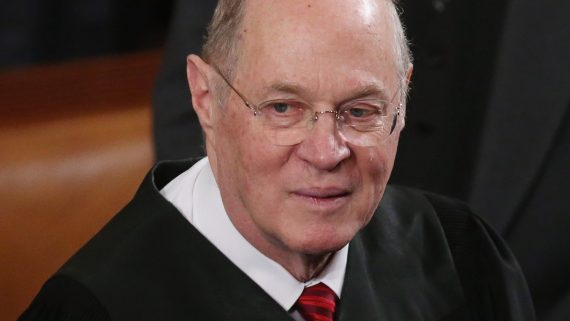

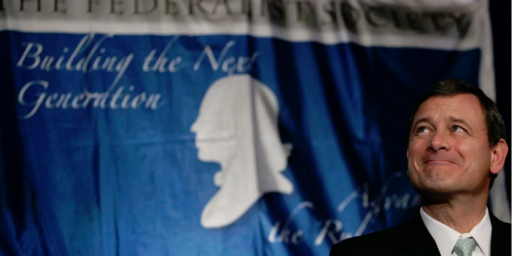
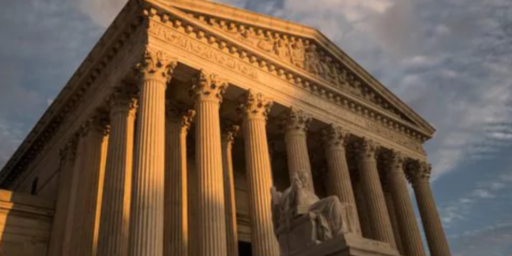
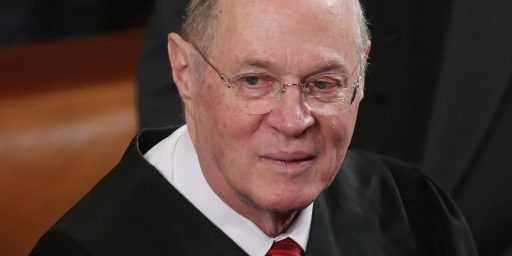
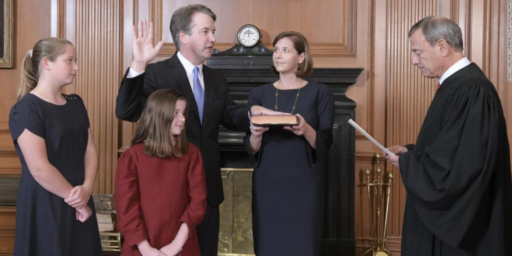
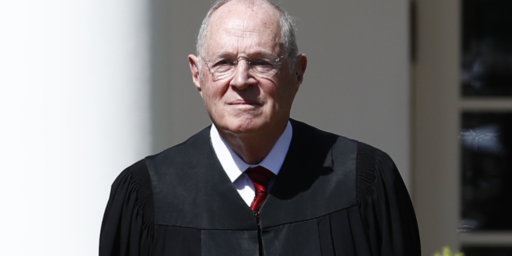
And once again I’d like to take this opportunity to thank liberals who thought that Hillary Clinton was one of the 2 evils on the ballot, and who subsequently declined to turnout, or rather to vote for Jill Stein.
This, THIS – appointments to the Supreme Court – was THE reason to vote for Hillary Clinton over Donald Trump. Other issues come and go, but nominations to the Supreme Court are for a generation at least.
So, for those of you who value ideological purity and correctness, thanks again.
Nice knowing you, Roe!
I suppose it’s too much to hope for that the entire Republican congressional caucus and the 30% of the electorate who’d vote for Hitler as long as he was running on a Republican ticket drops dead between now and November, 2018 …
And I agree with al-Ameda – I sincerely hope that this outcome causes unending grief for the purity police over to our left who voted Stein / voted Johnson / stayed home in a monumental fit of pique. They deserve nothing less than a plague of boils & locusts eating their lawns. I hope that they’re happy with what they got instead of Clinton.
I never thought I would find myself in the position of watching from abroad as my country disintegrates into 1930’s Germany, but there I find myself anyway … 🙁
abroad might not be a bad place to be.
If Trump is still president when Kennedy retires, if he does retire, who his replacement will be will depend solely on who has Trump’s ear at that moment. You know Trump didn’t come up with Gorsuch himself; Trump wouldn’t have known Gorsuch from Gore-Tex. Nor would I, I must grudgingly confess, but the crucial difference is that I would have made a concerted effort to find out that information.
whoever is GOP pres would pick from the same list of 3 dozen Federalist Society stars, it wouldn’t matter.
@HarvardLaw92:
Good to hear from Beavis today…….
@al-Ameda:
To be fair, there were A LOT more good reasons to vote for Hillary Clinton over Donald Trump.
For example–not to hand the nuclear codes to an orangutan.
That’s why it’s important for Democrats to retake the Senate in 2010. That’s what they should be doing.
Terribly off topic. Horribly off topic. But I knew this news item would interest everyone. From my local paper, The Tampa Bay Times local section page 3:
MAN SITS ON GUN, BULLET HITS HIS PENIS
Jacksonville: A Florida man accidentaly shot himself in the penis when he sat down on a gun in the driver’s seat in his car.
Several television news stations report that the Jacksonville Sheriff’s Office says the man ran into his girlfriend’s house Friday after the gun discharged. She saw that he had a wound in his groin and took him to the hospital, where he had surgery.
The Sheriff’s Office said the 38yr old man has a previous conviction for cocaine possession and now may face charges of being a felon in possession of a firearm.
Now back to Justice Kennedy (DON’T GO, SHANE!).
@Guarneri:
Don’t be so hard on yourself. You’re clearly Butthead, not Beavis.
🙄
@Andre Kenji de Sousa:
Which is, at this point, unlikely. As Ed Kilgore explains:
On a slightly more positive note, I don’t think it’s anywhere near as certain as most commentators are suggesting that John Roberts would vote to overturn Roe. He’s demonstrated a distinct “avoid chaos” philosophy in the past. (At least deliberate chaos, which I think would exclude Citizens United.)
@HarvardLaw92: I’m in Germany for a couple weeks and while the Germans I’ve talked to have been fine with me as an American, they all ask the same question: how could we have elected such a moron as President?
He’s a true laughingstock over here. No respect whatsoever.
I can confirm that. Even at his worst I always thought about Bush Jr. as (a probably inept) President.
I primarily think about Trump as “that real estate conman”. It takes real effort to remember that he’s also an office-holder.
This is way off topic but in line with Harvard’s comment about this country turning into 1930’s Germany.
I think it’s incredibly important for everyone to understand what is happening out there today…
http://m.huffpost.com/us/entry/us_595a6656e4b0da2c7324d3d6?ncid=inblnkushpmg00000009
@JohnMcC: Florida. Of course. I’m retiring to FL soon. Gawd.
However, you can get the same thing in PA. Saturday, in response to false rumors Antifa planned to vandalize Confedarate monuments and graves, a bunch of KKK, SCV, and other assorted deplorables gathered at the Gettysburg battlefield, in their usual combat cosplay accouterments, complete with pretend assault rifles. The only reported violence was that one of the Responsible Gun Owners ™ shot himself in the leg.
ginsburg can’t last much longer can she?!
@bill:
I don’t know, let’s ask Justice Scalia, he’s in Mitch McConnell’s backyard, seated in an adirondack chair
@HarvardLaw92:
Johnson took more votes from Trump than Clinton, its Stein who mainly took votes that otherwise would have gone for Clinton.
Ideally Johnson would have kept in the race and Stein would have dropped out, giving the GOP purists a viable choice but denying one to the Dem purists, though the reality is probably most purists simply wouldn’t have voted if 3rd party candidates weren’t available.
“None of the above” (as in can’t be bothered to vote) won the plurality in this, as in just about every election.
I have to admit its kind of amusing that a vote for either Stein or Johnson counts (according to pundits) as three votes.
i) for who they directly voted for.
ii) according to Clinton followers, a vote for Stein or Johnson was a vote for Trump.
iii) according to Trump followers, a vote for Stein or Johnson was a vote for Clinton.
Its not often you can legally get the equivalent of three ballots with one vote.
More to the point, the target voters to reach in 2018 and 2020 are those who never bothered voting, rather than those who voted 3rd party; its a much larger group, and most non-voters don’t have pre-established opinions (other than thinking that its a waste of time).
@george:
That claim hasn’t been borne out by exit polls:
I should note that these results surprised me. I knew Johnson was attracting some disaffected lefties (I talked to one), but I was sure he’d take more from Trump than from Clinton. I did notice early on that Clinton was doing worse in polls that included the third-party candidates, suggesting they were hurting her more than Trump. But my theory about it at the time was that, although Johnson alone hurt Trump more than Clinton, the fact that she had to contend with two third-party candidates whereas Trump only had to contend with one meant that the net result was a bigger loss for her.
But if these exit polls are to be believed, it turns out that Johnson alone did indeed siphon off more votes from Clinton than from Trump, and in roughly the same proportions as with Stein (though the margins were small, and it’s important not to lose sight of the fact that the overwhelming majority of Johnson and Stein voters said they would not have voted at all). It’s worth asking why, especially since Johnson’s economic program was virtually the polar opposite of Bernie Sanders’. I could see his social and foreign policy views having attracted some lefties, but given that the centerpiece of the Sanders movement consisted of such causes as single-payer health care, free education, and a higher minimum wage, it’s surprising that so many of them flocked to a candidate who advocated doing away with much of the country’s social safety net–until you realize that many of these voters were motivated more by a personal hatred of Hillary Clinton than by any policies she stood for.
@Kylopod: The apparent interchangeability of Johnson and Stein in the minds of third party voters is another demonstration of the fact that the electorate, right, left, and middle; are a box of rocks.